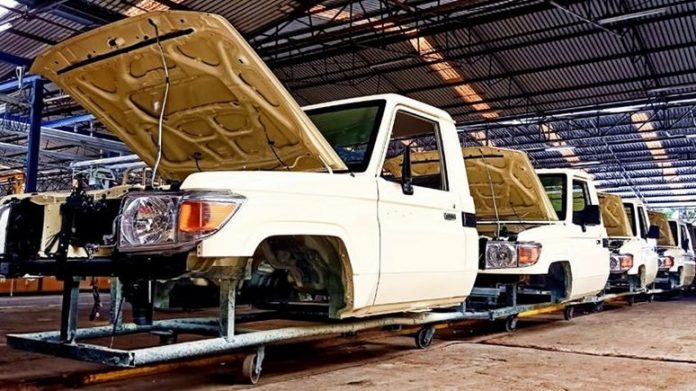Simba Corp is assembling the Mahindra single and double cabin pick-ups in Kenya for the first time in its history. The assembly, at Associated Vehicle Assembly (AVA) comes at a strategic time when the government is working on implementing its National Automotive Policy, which is expected to boost local assembly and discourage importation of used cars.
The first dozen of the locally assembled pick-ups are in the final stages of assembly at the AVA plant in Mombasa. Mahindra’s local franchise holder Simba Corporation is keen on delivering the product to the market to increase consumer access in a bid to defend and gain market share in the increasingly competitive commercial pick-up vehicle segment. Mahindra has been selling commercial pick-ups and passenger cars in Kenya since 2012 via Simba Corporation Ltd.
Dinesh Kotecha, the Group Chief Executive Officer of Simba Corp said: “We are confident that Mahindra will solidify its presence in the Kenyan market with the local assembly of pick-ups.”With the government increasingly creating favourable conditions for assemblers, motor vehicle dealers’ preference for local assembly is expected to grow leading to job creation, growth of skills and ultimately spur economic growth.Dealers assembling vehicles locally are exempted from the 25% import duty levied on fully-built imported vehicles, an incentive that gives room for assemblers to produce cheaper vehicles.
Mahindra’s Chief of International Operations Arvind Mathew said that Kenya was a key platform in the company’s plan to expand in Africa as the company targets both businesses and private motor vehicle buyers.
“Kenya is very key in our Africa strategy and it is informed by a research study we concluded in 2018 to understand the market need and tailor products that offer far beyond expectations,” Mr Mathew said at the Mahindra headquarters in Mumbai last week. “We have made extensive service networks and made sufficient spares available as part of the beginning where more brands are going to be available in the market.”
Already, there are seven Mahindra pick-up models and sports utility vehicles (SUVs) in the Kenyan market.
The car maker was embroiled in a storm in Kenya in the 1980s when one of the models was supplied to the police force but failed to live up to expectations due to lack of spare parts while the quality of its vehicles was also questioned. However, it has been selling vehicles to individuals and businesses over years.
Part of its global expansion plan has been the setting up of a 125-acre research and development plant in the southern India city of Chennai. The facility has 33 laboratories and about 2,000 workers. The firm has been seeking to produce vehicles that comply with emission standards set by European regulators as well as electric cars. It has also set its sights on the future with technology with its DiGiSENSE innovation, which allows for realtime-tracking as well as vehicle diagnostics.
The Mahindra Group, a $20.7 billion conglomerate, also has a strong presence in information technology and agribusiness and is the world’s largest tractor company by volume.
The firm’s East Africa General Manager, Sandesh Parab, said the start of its local assembly will add to the affordability of the vehicles that are made for the local environment.
“We hope to capture about seven to eight percent of the market share in one year,” said Mr Parab. “Our customers will also get negotiated financing deals from Kenya Commercial Bank and we hope to have more players on board to facilitate them grow business using our pick-up trucks.”
The government has been working on implementing its National Automotive Policy, which is expected to boost local assembly of motor vehicles in the country, discourage importation of used cars and fully built new vehicles.
Dealers assembling vehicles locally are exempted from the 25 percent import duty that is levied on fully-built imported vehicles, an incentive that gives room for assemblers to produce cheaper vehicles and create a local value chain benefitting economic growth in the country.
This incentive has spurred more vehicle manufacturers to start local assembly of vehicles.
Last month, Isuzu East Africa started assembling its D-Max pick-up trucks in Kenya, ending its tradition of importing ready made light commercial vehicles from South Africa.
DT Dobie, will be unveiling a new car, the Volkswagen Tiguan Allspace, which is now being locally assembled. The firm said the local assembly of the car was in line with the government’s Big Four agenda that includes supporting local manufacturing.
Also Read: Mahindra targets 30% of small commercial vehicle market




